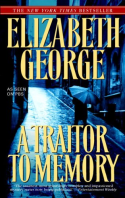 Book description:
Book description:
When Eugenie Davies is killed by a driver on a quiet London street, her death is clearly no accident. Someone struck her with a car and then deliberately ran over her body before driving off, leaving nothing behind but questions.
What brought Eugenie Davies to London on a rainy autumn night? Why was she carrying the name of the man who found her body? Who among the many acquaintances in her complicated and tragic life could have wanted her dead? And could her murder have some connection to a twenty-eight-year-old musical wunderkind, a virtuoso violinist who several months earlier suddenly and inexplicably lost the ability to play a single note?
For Detective Inspector Thomas Lynley, whose own domestic life is about to change radically, these questions are only the first in an investigation that leads him to walk a fine line between personal loyalty and professional honor.
Review:
I finished A Traitor to Memory last night and have spent most of today trying to find the words to explain why I didn’t like it very much. The one thing that keeps coming back to me is that it just felt somehow empty, especially in comparison with the previous few books in the series.
It’s November now, a couple of months since Barbara got demoted and she and Lynley spent an entire book at odds with each other. While it’s certainly a relief that they are getting along well again, it is fairly strange that neither ever reflects upon their period of estrangement. In fact, there is exceedingly little from Barbara’s point of view and no appearances by her charming neighbors. Compensating slightly for this omission, however, are some segments from Winston Nkata’s perspective.
Anyway, the case in question involves a series of hit-and-run accidents that are connected to the murder of a child that Superintendent Webberly (Lynley’s boss) investigated twenty years ago. Interspersed with the feats of detection are journal entries by a violin prodigy named Gideon Davies who is in therapy to discover the reason for his abrupt inability to play his instrument. As with many books in this series, one must have patience and wait for the a-ha moment that connects seemingly disparate elements, and there are quite a few of those in this novel. “Ohhhh,” one says, “so that’s who he is!”
Unfortunately, I found the final solution… inelegant. Oh, I can devise arguments in its favor, namely that in the real world, detectives frequently do not learn why a given suspect did something, only that they did. But readers are spoiled and we are accustomed to learning such details. The evidence is sufficient, but without that extra level of confirmation it’s not quite as satisfying. Also, there’s a shock ending that inspires conflicting reactions. On one hand, it’s a neat twist, but on the other, I highly doubt that George will ever get around to revealing what actually happened, especially as the next book in the series (A Place of Hiding) is about Simon and Deborah St. James and not anyone inclined to comment on the details of this case.
Ultimately, this was a long, slightly tedious, and rather disappointing installment in the Lynley-Havers series. Not that this will in any way dissuade me from continuing on, however!




I just read this book on the Kindle app for iPhone and I don’t have the patience to reread the words on a tiny screen. Can someone please tell me who actually drowned Sonia and why? Thanks in advance.
A little bit of poking around reveals that it’s left somewhat vague.
SPOILER WARNING
One person believes that they did, but another tells them that *they* did, and the first person doesn’t know whether it’s true.